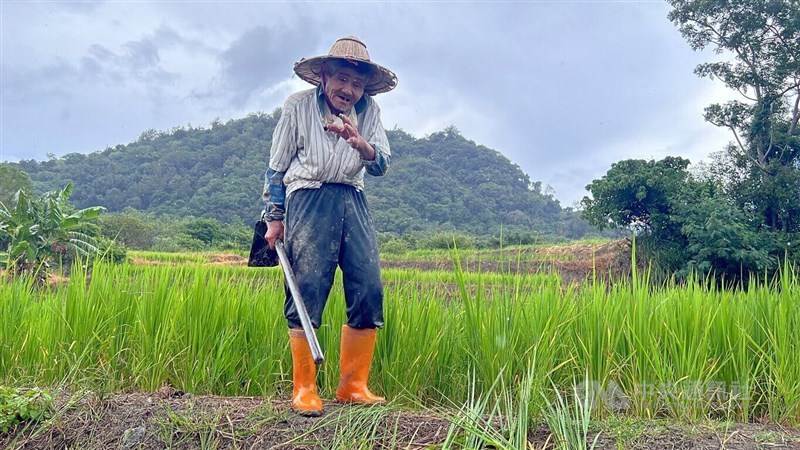In an age dominated by technological agriculture and an aging population of farmers, 91-year-old Lo Mao-hsiang (羅茂祥) stands as a rare and inspiring figure in Taiwan’s rural heartland. A native of Taitung County, Lo has spent over seven decades nurturing rice fields — not just for harvest, but as a way of life and cultural preservation.
Lo is the oldest active member of the Taitung Chishang Farmers’ Association. Each day, he can still be found walking the perimeter of his nearly one-hectare rice field, trimming grass, checking soil conditions, and preparing for the next harvest season of his favorite crop: Ugly Beauty, a distinct variety of rice officially known as Kaohsiung No. 139.
A Farmer Rooted in Time but Not Stuck in the Past
Lo began farming as a teenager, inheriting the knowledge and discipline of traditional rice cultivation from his parents. For decades, he worked the land manually with the help of water buffalo, resisting the mechanical changes that swept across Taiwanese agriculture. It wasn’t until 13 years ago — just before turning 80 — that he finally parted ways with his last two buffalo and allowed machines into his fields.
“I thought that was the end,” Lo said, recalling the emotional farewell. “But the land called me back.”
What changed? His children, once urban migrants, returned home and brought with them modern farming equipment. With their support and mechanized tools, Lo found a way to continue his craft without sacrificing his connection to the earth.
Why ‘Ugly Beauty’ Is His Rice of Choice
Lo’s enduring love is for the Ugly Beauty rice variety. While it may lack the polished perfection of competition-winning grains, it compensates with texture — soft, springy, and perfect for Taiwanese cuisine. First cultivated in 1975 by the Kaohsiung District Agricultural Research and Extension Station, the variety gained international attention in 2004 when it became Taiwan’s first rice export to Japan following a decades-long import ban.
Despite its commercial hurdles — especially in a marketplace that often values appearance over taste — Lo never wavered in his commitment to growing it. Today, he remains one of the last few contract farmers in Taiwan cultivating this heritage grain.
“I never joined competitions,” he said modestly. “Ugly Beauty might not win any prizes, but it makes good meals — and that’s what counts.”
Symbol of Endurance and Adaptation
Lo’s story is not just about one farmer’s commitment — it’s a narrative that mirrors Taiwan’s broader agricultural transformation. It raises questions about how traditional farming can survive in a rapidly urbanizing society, and how to pass down knowledge in a sector that’s aging faster than any other.
His personal motto could be described as: evolve but never forget your roots. Even as he embraces modern machinery, Lo stays involved in every step of the farming process, proving that resilience and tradition can coexist.
FAQs
Who is Lo Mao-hsiang?
Lo is a 91-year-old farmer in Taitung County, Taiwan. He’s the oldest member of the Chishang Farmers’ Association and continues to farm rice, including a rare variety called “Ugly Beauty.”
What is Ugly Beauty rice?
Also known as Kaohsiung No. 139, it is a chewy, sticky rice developed in 1975. It lacks aesthetic appeal but is beloved for its texture and flavor.
Why is Lo’s story significant?
Lo represents a generation of traditional farmers adapting to modern times without losing their cultural and agricultural values. His longevity and commitment also spotlight the sustainability of Taiwan’s agricultural roots.
What challenges do traditional rice varieties like Ugly Beauty face?
Due to its appearance, Ugly Beauty often doesn’t win competitions, which reduces its popularity among farmers. However, it remains a high-quality grain with historical and culinary significance.
How is Taiwan addressing aging in agriculture?
Through mechanization and family-supported farming, along with government agricultural incentives, Taiwan is working to modernize farming and encourage younger generations to return to rural life.


